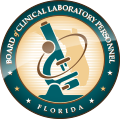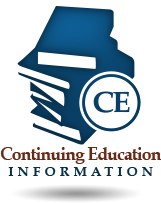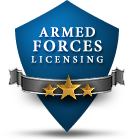CHAPTER 64B3-3
APPROVAL OF CLINICAL LABORATORY PERSONNEL TRAINING PROGRAMS
64B3-3.001 General Requirements of Clinical Laboratory Personnel Training Programs
64B3-3.002 Personnel of Clinical Laboratory Personnel Training Programs
64B3-3.003 Curriculum Requirements for Clinical Laboratory Personnel Training Programs
64B3-3.001 General Requirements of Clinical Laboratory Personnel Training Programs.
(1) Each clinical laboratory personnel training program, hereinafter referred to as program, shall apply to the board for initial approval on Form #DH-MQA 3007 (02/18) “Initial Application for Clinical Laboratory Personnel Training Program,” http://www.flrules.org/Gateway/reference.asp?No=Ref-09998, which is incorporated by reference herein and pay the fee set forth in subsection 64B3-9.001(3), F.A.C. For renewal, each clinical laboratory personnel training program shall apply for renewal to the board on Form DH5030-MQA (02/2018) “Renewal Application for Clinical Laboratory Personnel Training Program, http://www.flrules.org/Gateway/reference.asp?No=Ref-09999, which is incorporated by reference herein and pay the fee set forth in subsection 64B3-9.004(6), F.A.C.
(2)(a) Programs shall submit a proof of accreditation verification documentation from the National Accrediting Agency for Clinical Laboratory Science (NAACLS), the Council on Accreditation of Allied Health Education Programs (CAAHEP), or the Accrediting Bureau of Health Education Schools (ABHES).
(b) Programs that are pending national accreditation shall submit proof of accreditation status with the application.
(3) All trainee’s names shall be reported to the Board upon acceptance into the clinical laboratory personnel training program and at the time of the program’s biennial renewal. The program director shall notify the Board when a trainee withdraws.
(4) Each training program shall:
(a) Designate space and laboratory equipment for proper training of students.
(b) Maintain a file on each student which shall contain a completed application, evidence of high school graduation or completion of college courses, if applicable, attendance records, grades, instructor evaluations of laboratory practice, the trainee’s registration, and a copy of the student’s certificate of completion or official transcript.
(c) Maintain current examinations and laboratory evaluation instruments utilized by the program.
(d) Provide the student with a certificate or letter of graduation or a transcript indicating the degree granted. Certificates or letters of graduation shall be signed by the program director.
(e) Include instruction in human immunodeficiency virus and acquired immunodeficiency syndrome.
(f) Include instruction on the prevention of medical errors, which shall include root-cause analysis, error reduction and prevention, and patient safety.
(g) Upon initial application and at each biennial renewal, the training program shall provide: a current copy of the Clinical Laboratory Improvements Act of 1988 (CLIA) certification; State of Florida license verification for each clinical affiliate; and the names, addresses, license numbers, personnel rosters of all affiliates that provide clinical training for the trainees enrolled in the program.
(h) Include course objectives, course descriptions, course outlines, assessment of outcomes, student evaluations and graduate evaluations in the curriculum.
(i) Utilize educational resources for teaching the affective, cognitive, and psychomotor domains.
(j) Employ systematic procedures for assessing learning outcomes in the affective, cognitive, and psychomotor domains.
(k) Have a practicum in a clinical laboratory where current laboratory procedures, instrumentation and diversity of specimens are available for a variety of analyses and are in sufficient quantity to provide competent training for the student.
(l) Include instruction on Florida laws and rules governing clinical laboratories and clinical laboratory personnel.
(5) Clinical training programs that are not nationally accredited but were approved by the Board must submit; a curriculum outline including the number of lecture hours, lab, and clinical hours; copies of national certification of faculty; national certification examination pass rates; program completion rates; and graduate placement rates and graduate employment survey results for the three (3) years prior to the submission of the renewal application.
(6) A clinical laboratory personnel training program which is not in compliance with chapter 64B3-3, F.A.C., shall be denied approval or a prior approval shall be rescinded.
Rulemaking Authority 483.805(4), 483.811(2) FS. Law Implemented 483.807, 483.809, 483.811 FS. History-New 12-28-94, Amended 7-12-95, 4-24-96, Formerly 590-3.001, Amended 1-11-99, 11-15-99, 9-29-02, 2-2-04, 12-5-04, 2-23-06, 4-29-13, 7-20-14, 6-7-16, 11-14-18
64B3-3.002 Personnel of Clinical Laboratory Personnel Training Programs.
(1) A clinical laboratory personnel training program shall have a program director who holds national certification from any Board listed in subsection 64B3-5.002(3), F.A.C., and:
(a) Holds an earned doctoral or master’s degree in a chemical, biological or clinical laboratory science and has three (3) years of experience in clinical laboratory science education, or
(b) Holds a baccalaureate degree in a chemical, biological or clinical laboratory science and has five (5) years of experience in clinical laboratory science education.
(2) Instructors of clinical laboratory science courses in each program shall teach only in areas in which they have pertinent clinical laboratory or teaching experience and shall either:
(a) Be licensed as a technologist, supervisor or director, or
(b) Have a minimum of three (3) years of pertinent clinical laboratory experience or experience in clinical laboratory science education and holds national certification from any Board listed in subsection 64B3-5.002(3), F.A.C.
(3) There shall be at least one licensed technologist or supervisor on duty for each trainee during the trainee’s scheduled practicum. If the training program provides an instructor whose sole responsibility is trainee instruction, the ratio shall be one instructor for three trainees.
(4) Trainee Requirements. Trainees shall:
(a) Not be substituted for licensed clinical laboratory personnel.
(b) Be registered when enrolled in the practicum portion of the training program.
(c) Not report clinical laboratory test results.
(d) Perform tests only when a director, supervisor or technologist is in the immediate bench area where the trainee is performing tests.
Rulemaking Authority 483.805(4), 483.811(2) FS. Law Implemented 483.809, 483.811 FS. History-New 12-28-94, Amended 3-28-95, 7-12-95, 4-24-96, Formerly 590-3.002, Amended 9-20-98, 12-13-98, 11-15-99, 12-7-11, 9-4-18
64B3-3.003 Curriculum Requirements for Clinical Laboratory Personnel Training Programs.
(1) All programs shall provide instruction in pre-analytical, analytical, and post-analytical testing processes.
(2) All programs not accredited by the National Accrediting Agency for Clinical Laboratory Science (NAACLS), the Council on Accreditation of Allied Health Education Programs (CAAHEP), or the Accrediting Bureau of Health Education Schools (ABHES) shall adopt the 2017-2018 curriculum frameworks for Health Science Education set forth by the Florida Department of Education. The Health Science Core standards number 1-11 at http://www.fldoe.org/core/fileparse.php/5652/urlt/health_sci_core_psav_cc_1718.rtf and available at http://www.flrules.org/Gateway/reference.asp?No=Ref-09840 are incorporated by reference herein. Curriculum framework numbers 12-25 at http://www.fldoe.org/academics/career-adult-edu/career-tech-edu/curriculum-frameworks/2017-18-frameworks/health-science.stml which are incorporated by reference herein (curriculum frameworks) and available at http://www.flrules.org/Gateway/reference.asp?No=Ref-09841. All programs must meet the curriculum frameworks number 1-25.
(3) Each specialty shall comply with the relevant curriculum frameworks:
(a) For molecular pathology, curriculum framework numbers 26 and40;
(b) For urinalysis, curriculum framework number 27;
(c) For hematology, curriculum framework numbers 28, 29, 34 and 35;
(d) For immunology, curriculum framework numbers 30 and 38;
(e) For clinical chemistry, curriculum framework numbers 31 and 37;
(f) For immunohematology, curriculum framework numbers 32 and 39;
(g) For microbiology, curriculum framework numbers 33 and 36.
(4) For the category of cytogenetics, technologist level programs shall as a minimum include instructions in the following competencies:
(a) Appropriate culture techniques for submitted specimens.
(b) Principles and techniques for harvesting specimens or cell cultures.
(c) Principles and techniques of chromosome banding and staining.
(d) Maintenance and use of microscopes and photographic and computer generated imaging techniques and equipment.
(e) Chromosome analysis.
(5) For the category of histocompatibility, technologist level programs shall at a minimum include instruction in the following competencies:
(a) Specimen collection, processing, handling and preservation as it relates to histocompatibility testing.
(b) Principles and techniques of blood typing, HLA typing, HLA antibody screening, and testing for infectious disease makers.
(c) CDC or flow cytometry cross matching, HLA antibody identification, lymphocyte immunophenotyping, mixed lymphocyte culture, stem cell culture and immunosuppressive drug analysis.
(d) Allogenic and autologous bone marrow processing and storage.
(e) Maintenance and use of instrumentation utilized in the category of histocompatibility testing.
(f) Immunological principles to perform, assess, and interpret histocompatibility data.
(6) For the category of cytology, technologist level programs shall at a minimum include instruction in the following competencies:
(a) Specimen preparation, staining and cover slipping.
(b) Quality control and follow-up.
(c) Specimen adequacy.
(d) Review of gynecological and non-gynecological specimens in order to delineate data regarding human cytopathological disease.
(e) Reporting of results using appropriate diagnostic terminology.
(7) For the category of blood banking, technologist level programs shall adopt the curriculum standards defined in paragraph 64B3-3.003(2)(a), F.A.C., for immunohematology, as well as provide instruction in the following competencies:
(a) Serology instrumentation and serological principles associated with blood product testing and processing.
(b) Clinical chemistry instrumentation and chemistry principles associated with blood product testing and processing.
(c) Hematology instrumentation and hematological principles associated with blood product testing and processing.
(8) For the category of embryology, technician or technologist level programs shall at a minimum include instruction in the following competencies:
(a) Maintenance and use of instrumentation utilized in the embryology laboratory.
(b) Principles and techniques for isolating specimens.
(c) Appropriate culture techniques of specimens including principles of culture techniques.
(d) Appropriate handling of specimens.
(e) Quality control and quality assurance.
(9) For the category of andrology, technician or technologist level programs shall at a minimum include instruction in the following competencies:
(a) Maintenance and use of instrumentation utilized in the category of andrology testing.
(b) Principles and techniques for isolation specimens.
(c) Appropriate culture techniques of specimens including principles of culture techniques.
(d) Appropriate handling of specimens.
(e) Quality control and quality assurance.
(10) Technologist level programs shall include education instruction and management.
Rulemaking Authority 483.805(4), 483.811(2) FS. Law Implemented 483.809, 483.811 FS. History-New 5-9-95, Amended 12-4-95, 4-24-96, Formerly 590-3.003, Amended 3-19-98, 9-20-98, 1-11-99, 10-30-02, 7-18-04, 2-23-06, 1-6-09, 9-12-18.





